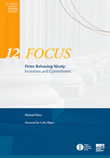 Ever since the rise of large firms in the 18th century, debate has been raging about how to combine economic efficiency and productivity with socially desirable behavior of firms. This paper reviews the debate starting with the classic corporate governance argument about shareholder rights. It discusses the potential incentives to exploit other stakeholders unduly and examines some mechanisms, beyond contracts and regulation, to cope with this exploitation.
Ever since the rise of large firms in the 18th century, debate has been raging about how to combine economic efficiency and productivity with socially desirable behavior of firms. This paper reviews the debate starting with the classic corporate governance argument about shareholder rights. It discusses the potential incentives to exploit other stakeholders unduly and examines some mechanisms, beyond contracts and regulation, to cope with this exploitation.
In this light it considers reputational mechanisms, using the example of corporate social responsibility, and changes to the constitution of firms, with emphasis on the nonprofit form of enterprise. Based on evidence so far, the for-profit firm with mechanisms assuring sound shareholder rights remains preferable to the alternatives. However, scope for experimentation with mechanisms such as different classes of shareholders with differing voting rights may be socially useful, which suggests that global corporate governance principles thus should not be prescriptive in detail. Download the publication here.
About the Author:
Michael Klein is a professor of development policy at the Frankfurt School of Finance and Management in Germany and a senior adjunct professor at the School of Advanced International Studies of Johns Hopkins University.
Foreword by Colin Mayer.


